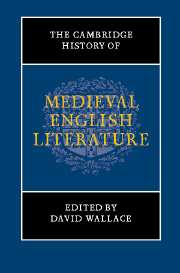Book contents
- Frontmatter
- I AFTER THE NORMAN CONQUEST
- II WRITING IN THE BRITISH ISLES
- III INSTITUTIONAL PRODUCTION
- IV AFTER THE BLACK DEATH
- V BEFORE THE REFORMATION
- Introduction
- 24 Hoccleve, Lydgate and the Lancastrian court
- 25 Lollardy
- 26 Romance after 1400
- 27 William Caxton
- 28 English drama: from ungodly ludi to sacred play
- 29 The allegorical theatre: moralities, interludes, and Protestant drama
- 30 The experience of exclusion: literature and politics in the reigns of Henry VII and Henry VIII
- 31 Reformed literature and literature reformed
- Chronological outline of historical events and texts in Britain, 1050–1550
- Bibliography
- Index of manuscripts
- Index
- References
25 - Lollardy
from V - BEFORE THE REFORMATION
Published online by Cambridge University Press: 28 March 2008
- Frontmatter
- I AFTER THE NORMAN CONQUEST
- II WRITING IN THE BRITISH ISLES
- III INSTITUTIONAL PRODUCTION
- IV AFTER THE BLACK DEATH
- V BEFORE THE REFORMATION
- Introduction
- 24 Hoccleve, Lydgate and the Lancastrian court
- 25 Lollardy
- 26 Romance after 1400
- 27 William Caxton
- 28 English drama: from ungodly ludi to sacred play
- 29 The allegorical theatre: moralities, interludes, and Protestant drama
- 30 The experience of exclusion: literature and politics in the reigns of Henry VII and Henry VIII
- 31 Reformed literature and literature reformed
- Chronological outline of historical events and texts in Britain, 1050–1550
- Bibliography
- Index of manuscripts
- Index
- References
Summary
In 1376 John Wyclif, an Oxford theology master, was in London ‘running from church to church’ (as Thomas Walsingham put it) preaching that the ‘temporal lords could meritoriously withdraw [auferre] from sinful pastors their goods’ – could, in the jargon, disendow them. ‘He went even further, and said that temporal lords … could justly sell the goods of possessioners in order to relieve their own poverty’. These were respectable things to say, and welcome to the royal government, financially embarrassed since the 1340s and delighted to be told that confiscating church goods was ‘a work of charity, saving souls from hell’, as Wyclif is said to have told Parliament. Disendowment, as Wyclif described it, transcended mere opportunism: it was a duty to God and neighbour. Disendowment was no new idea, but Wyclif’s way of putting it was dazzlingly, brilliantly radical; it provoked a movement of religious dissent that extended beyond university and Parliament and beyond his death in 1384.
English ‘Lollardy’ never died and never joined the mainstream: the mainstream joined it, with the advent of Lutheranism, and hijacked its historiography. Foxe’s Actes and Monuments – the ‘Book of Martyrs’ – traced the survival of primitive Christian truth through the centuries of Catholic darkness. It was therefore bound to find a deep unity in the beliefs of Wyclif and his followers. It also presupposed a logic of persecution: before the Protestant Reformation, the mere speaking of this truth provoked, of necessity, the violence of repression.
- Type
- Chapter
- Information
- The Cambridge History of Medieval English Literature , pp. 662 - 689Publisher: Cambridge University PressPrint publication year: 1999
References
- 1
- Cited by



